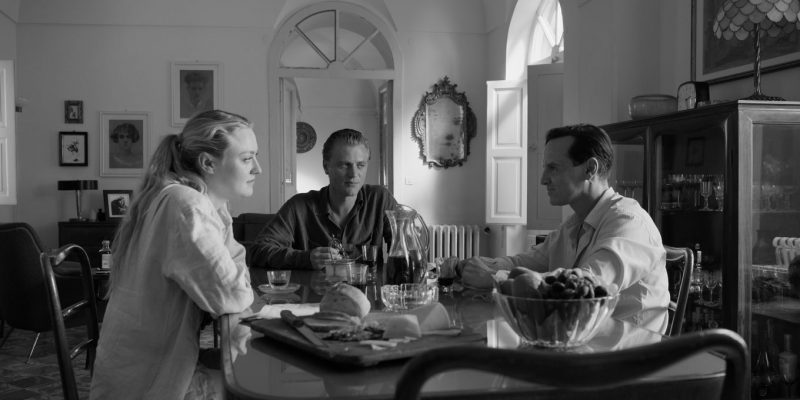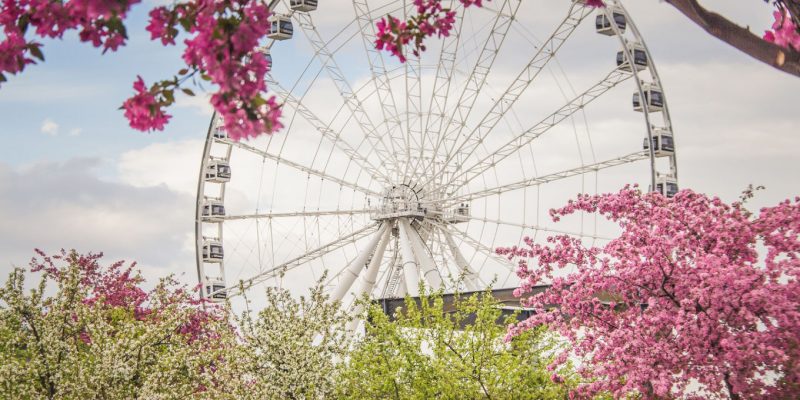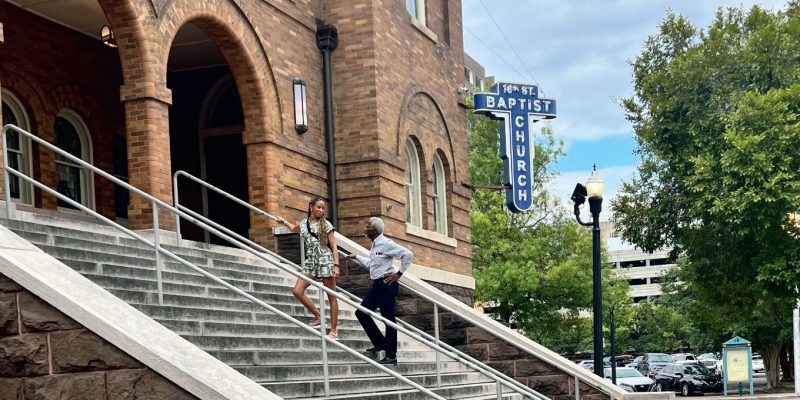Society
Devery Jacobs Is the Leader of the Pack
The Kanien’kehá:ka actor, filmmaker, Indigenous advocate and star of the breakout hit Reservation Dogs, is showing us that there’s nothing she can’t do.
by : Kelly Boutsalis- Sep 16th, 2022
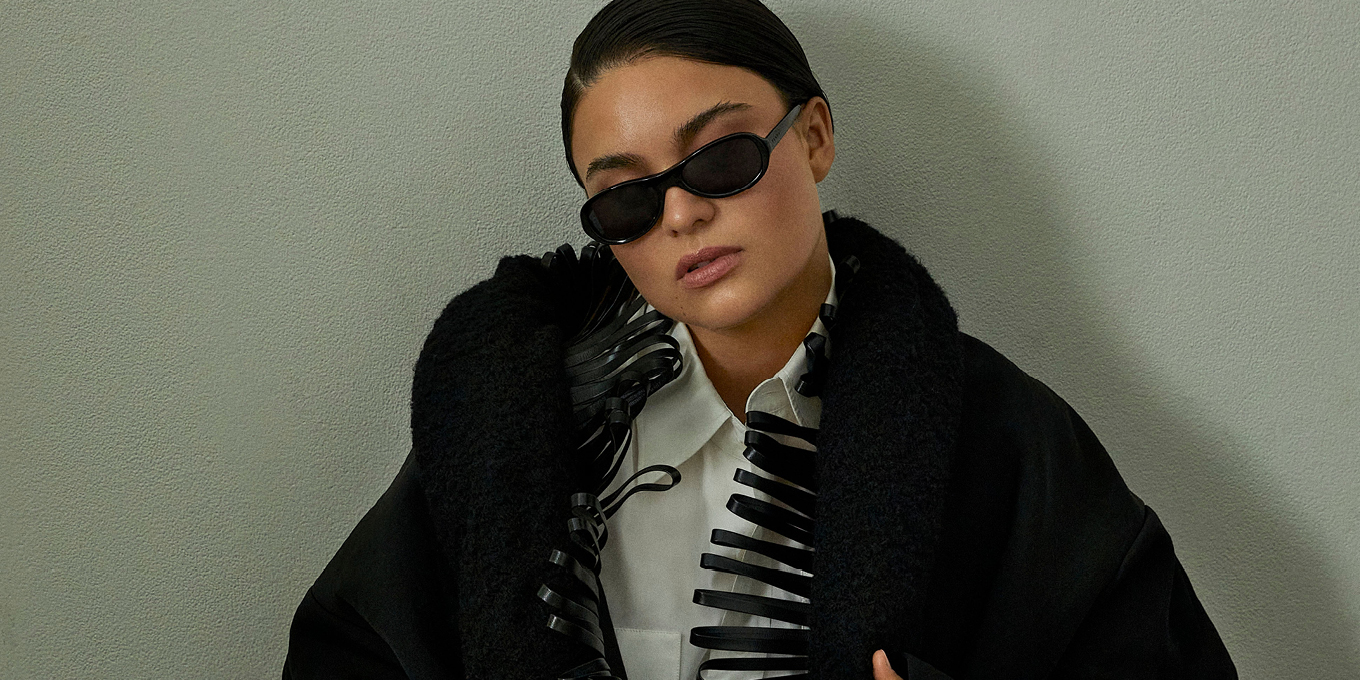
Brent Goldsmith
“It’s been a crazy time, a crazy year,” is the first thing Devery Jacobs says when we finally connect at the end of the summer after dropped calls, bad reception and squeezing me into a schedule that’s chock full of events and work.
Jacobs’ star has been officially on the rise for the past five years (“When have I risen?” she jokingly interjects), her performances having been praised by entertainment magazines, Canadian-film-industry bodies and critics alike. Despite the humble jokes, it feels like this is her moment. While the in-demand actor and filmmaker, who is proudly Kanien’kehá:ka, is originally from the Kahnawà:ke Mohawk territory near Montreal, she now lives in Toronto, and it’s there that she’s recharging for two days before starting work on a very exciting new project.
Currently, Jacobs is one of the lead actors in Reservation Dogs, a drama-comedy series from FX that began airing in August 2021; it received rave reviews and won awards, including the American Film Institute’s TV program of the year, the Film Independent Spirit Awards’ best new scripted series and best ensemble cast in a new scripted series and a Peabody Award. Its first season was unabashedly Indigenous, set on an Oklahoma reserve and featuring an almost-all-Indigenous cast and crew. The show is the brainchild of Muscogee/Seminole filmmaker Sterlin Harjo and executive producer Taika Waititi, the Maori/Jewish indie darling who brought his wacky sense of humour to Marvel with the two Thor films he directed, Ragnarok and Love and Thunder.
In the show, Jacobs portrays the determined and sulky Elora Danan, the leader of the “rez dogs,” a group of teens who are grappling with the loss of their friend Daniel in less-than-expected ways. (For instance, the first episode opens with the foursome stealing a chip truck in order to sell it.) “She can be perceived as somebody who’s moody and kind of hard to be around, and I know that she’s definitely contentious, given the choices that she makes, but Elora is all heart,” says Jacobs. In a particularly gut-wrenching episode near the end of the first season, it’s revealed that Elora is the one who discovered Daniel’s body. In addition to delivering a truly incredible performance, the actor volunteered to go even further by writing a piece for Time magazine about the truth that this story drew on. “All native folks have been touched in some way by suicide, so I think there was so much more to the story behind the scenes,” she says.
Her essay aimed to both illuminate non-Indigenous audiences on the hard-to-swallow suicide numbers in Indigenous communities and reveal how much care went into making that episode sensitively; it was written and directed by Nüümü, Diné and San Carlos Apache writer and director Tazbah Chavez. Chavez describes Jacobs as a true multi-hyphenate whom she hopes to work with again and again. “She has so much integrity,” she says. “And it’s funny—I feel like Elora can serve as a moral compass, and I would say that’s true of Devery too.”
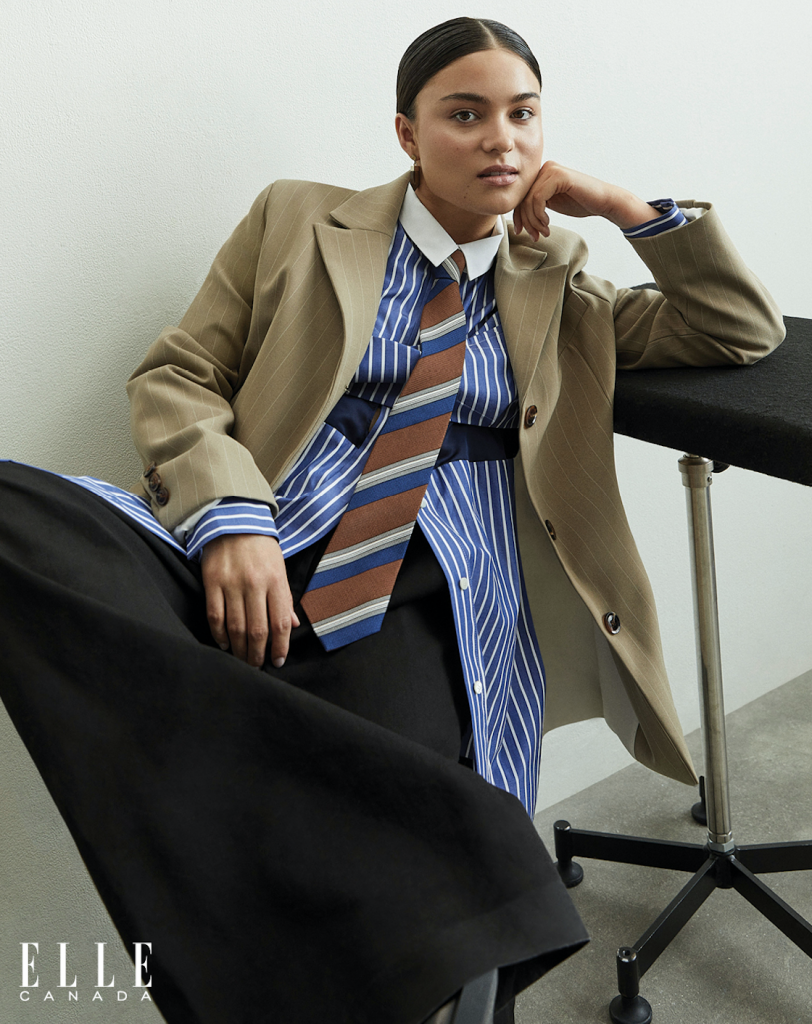 Shirt (Sacai), blazer (Samsøe Samsøe), pants (Dries Van Noten), earrings (Chloé) and tie (Louis Vuitton)
Shirt (Sacai), blazer (Samsøe Samsøe), pants (Dries Van Noten), earrings (Chloé) and tie (Louis Vuitton)The Time essay wasn’t an out-of-the-blue thing for Jacobs. She had already written several short films and co-written a feature film that debuted at this year’s Toronto International Film Festival, and, unsurprisingly, she was invited into the Reservation Dogs expanded writers room for the second season. “[It] felt like she’d been in a million writers rooms,” says Chavez, praising Jacobs’ timing, her pitches and the way she raised concerns about stories. For Jacobs, it was an empowering experience. “Getting to have a say in [my character’s] journey and getting to shape her in front of and behind the camera has been one of the greatest joys of my career to date,” she says.
Gathering with the show’s writers and hashing out where the storylines would go next required one thing, though—the team had to create a bubble for themselves as they didn’t want Reservation Dogs’ sudden acclaim and attention to impact the process. “We worked with blinders on, as if we were still only creating the show for ourselves,” Jacobs recalls. “We saw what people were saying, we felt the love from so many people and we were surprised by how many critics paid attention to the show—and we’re so grateful for that. At the end of the day, we had to focus on the story and cancel out all the noise.”
However, Jacobs had to miss the premiere and press tour of the newest season (which launched on Disney+ in Canada on September 7) thanks to a project she’s working on—part of what she calls “champagne problems.” It was tough for her to not be present for those moments, but as she’s often noted for being the big sister of the foursome—at 29, she is the oldest and has been acting the longest—she sees it instead as a time for the younger trio to flourish. “I feel like they’ve been kicked out of the nest and now they’re having to fly on their own,” says Jacobs. “To see how far they’ve come as actors and also as people makes me feel proud.”
That little project she’s been working on, by the way? Jacobs has joined the Marvel Cinematic Universe with a role in upcoming series Echo, set to air on Disney+ in 2023. Echo focuses on Maya Lopez (Alaqua Cox), who appeared in last year’s Hawkeye series, as she reconnects with her Native American past, bringing Indigenous people—including Jacobs’ character, Julie, whom she can’t reveal much about yet—into the MCU for the first time. It’s a pinch-me moment for Jacobs, a self-proclaimed “big graphic-novel geek.” She’s a huge fan of the Marvel movies that have thoughtfully incorporated the cultural stories of its superheroes, such as Black Panther and Shang-Chi and the Legend of the Ten Rings.
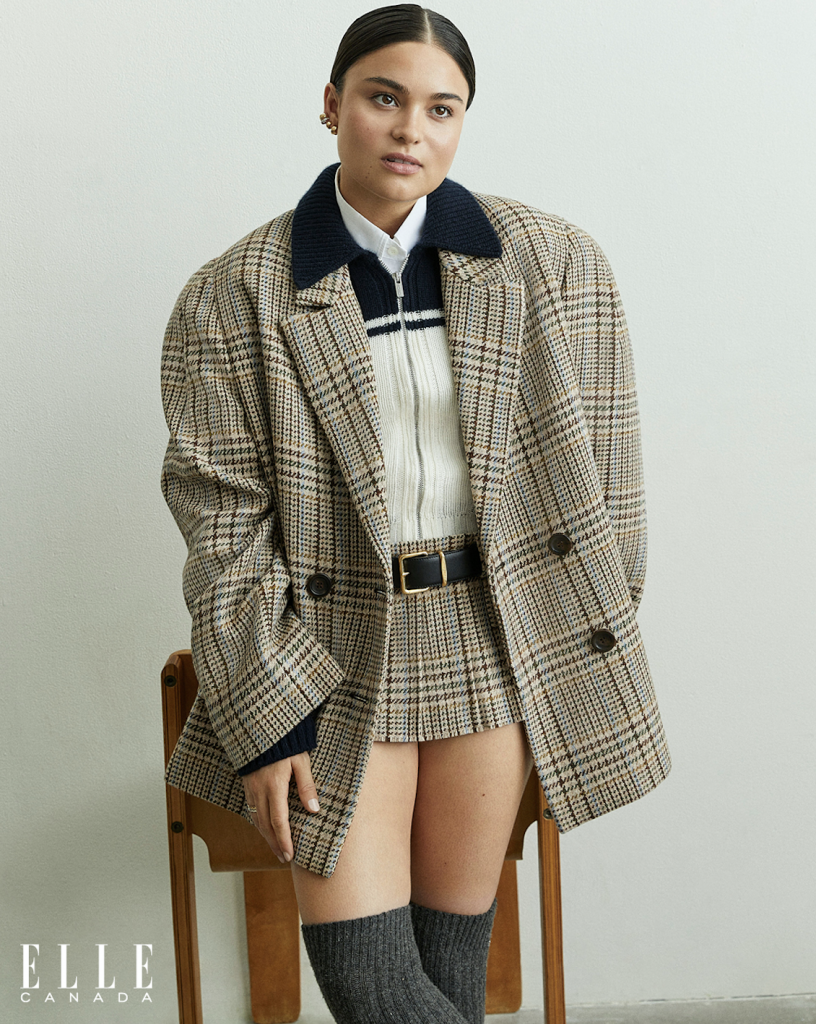 Shirt, cardigan, jacket, skirt, belt and socks (Miu Miu) and jewellery (Chanel Coco Crush) Vintage Plywood Chair (Post Design Collective)
Shirt, cardigan, jacket, skirt, belt and socks (Miu Miu) and jewellery (Chanel Coco Crush) Vintage Plywood Chair (Post Design Collective)“Getting to have a say in [my character’s] journey and getting to shape her in front of and behind the camera has been one of the greatest joys of my career to date. ”
Between its cast and storyline, Echo is steeped in Indigenous culture; it sees Jacobs paired with familiar names like actor Zahn McClarnon, who plays Big on Reservation Dogs, and director Sydney Freeland, with whom Jacobs worked on both Reservation Dogs and Rutherford Falls. “To be able to collaborate again with another queer Indigenous person—Sydney being trans and Navajo—is so awesome,” says Jacobs, who is an advocate for 2SLGBTQ+ and open about her sexuality.
Finding comfort and community extends beyond connecting on film and TV sets for the actor. She recently had dinner with Lakota Sioux actor Amber Midthunder, the first female Indigenous action hero, who is getting huge praise for her performance as the lead in Prey, a prequel to the Predator series. Despite the two being similar in age and up for the same roles, they’ve decided not to compete with each other. “[We were] talking about how [roles are] so scarce for native artists, which ends up forming a crab-in-the-bucket [mentality] where [you think] ‘If I’m not cast, it’s going to be this other person, and there’s only room for one,’” she says. “But that’s just not true right now.” And while it was the case when Jacobs and Midthunder met, they chose to make a commitment to always celebrate each other’s wins because they would be wins for both of them—and for other Indigenous actors. “I turned to her and said, ‘It’s my hope that we can be old Totas [“grandmothers” in Kanien’kehá:ka] in the industry and that we can look back at the things we were able to do together and feel like we have left it in a better place than when we first came into it.’”
While this boom of onscreen Indigenous representation may seem new, Jacobs is not new to the industry. Her breakout role was in 2013 Canadian indie film Rhymes for Young Ghouls, by Mi’kmaq director Jeff Barnaby; she gained recognition as the gas-mask-wearing, drug-dealing Aila, who fights against the Indian agent running the community’s residential school. “I was fortunate to be in Rhymes for Young Ghouls, which in its own right has taken on cult status,” she says. “That’s the world that I came from, and to have Rez Dogs be a mainstream success is something I never imagined could happen.”
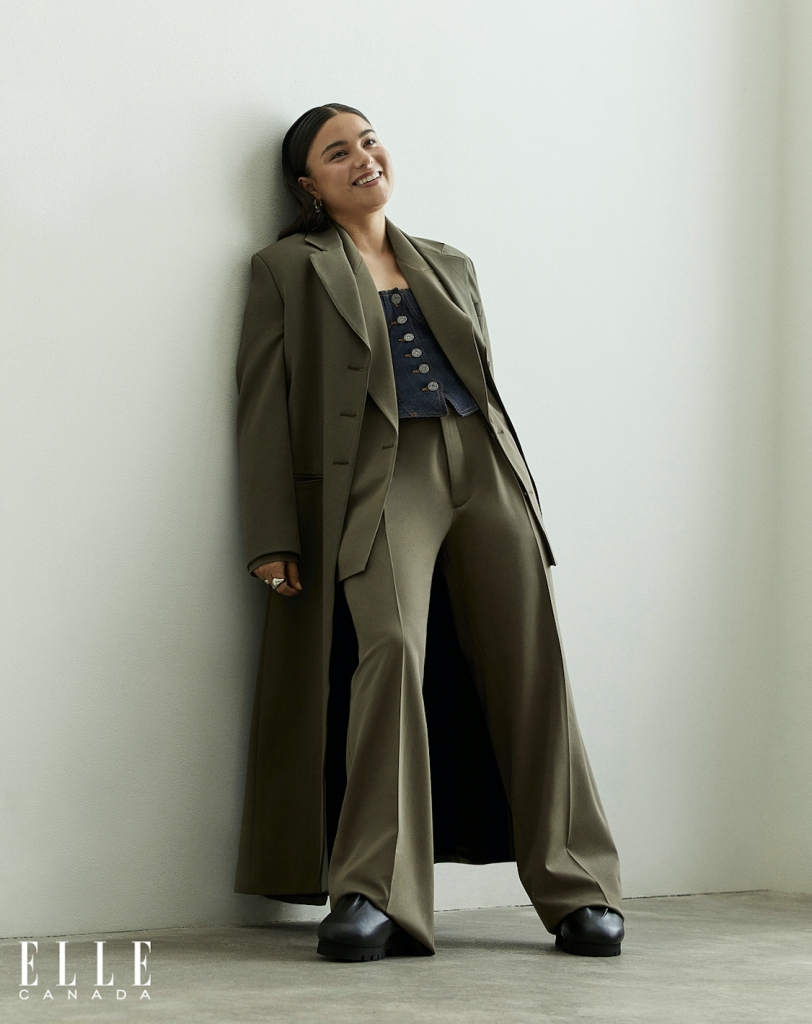 Blazer, bustier and pants (Jean Paul Gaultier), coat (Beaufille), earrings (AGMES NYC), rings (Biko) and shoes (Yume Yume)
Blazer, bustier and pants (Jean Paul Gaultier), coat (Beaufille), earrings (AGMES NYC), rings (Biko) and shoes (Yume Yume)“Going from fighting to have Indigenous stories be seen to enjoying the overwhelming success of season one of Rez Dogs feels like whiplash.”
Going from fighting to have Indigenous stories be seen to enjoying the overwhelming success of season one of Rez Dogs feels like whiplash, she says. “[I’m] used to screaming into a void and people not caring about Indigenous stories, so for this to suddenly take off… All of the rezzy-isms that I was shamed for are now being celebrated and universally respected as cool, which I always knew [they were] but the industry didn’t know yet. It’s all happening at once.”
Chavez recalls an instance when Jacobs asked to shadow her while she directed a second-season episode that doesn’t feature Elora. Despite having directing experience, Jacobs still showed up on-set with a notebook full of questions and took lots of notes. “That’s why I think she’s somebody who can do absolutely anything—she’s willing to learn and put in the work, and she has no ego around what she doesn’t know,” says Chavez. “There’s nothing Devery can’t do.”
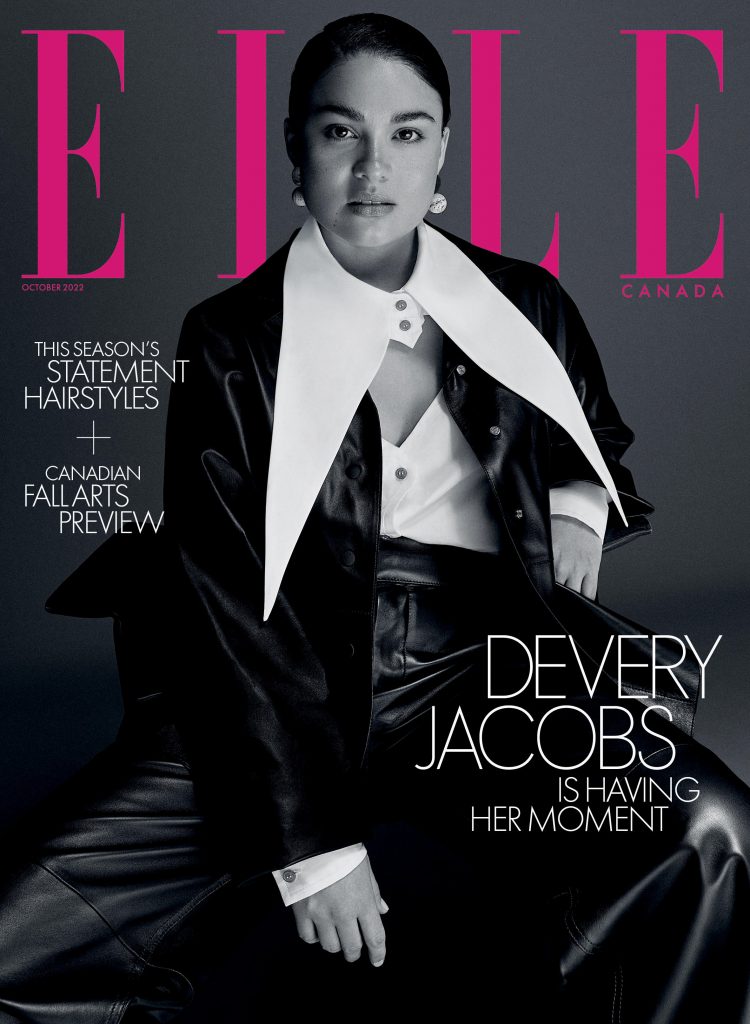
Find the full story in the October 2022 issue of ELLE Canada — out on newsstands and on Apple News+ September 19. You can also subscribe for the latest in fashion, beauty and culture.
Newsletter
Join our mailing list for the latest and biggest in fashion trends, beauty, culture and celebrity.
Read Next

Fashion
Are Fashion Brands Getting Greener?
While the fashion industry is making a lot of noise about being more sustainable, a closer look shows that its earth-friendly commitments are often more illusion than reality.
by : Marouchka Franjulien- Apr 19th, 2024

Beauty
What Beauty Packaging Is Actually Sustainable?
We sought out leaders in the field to help us get to the bottom of the blue bin once and for all.
by : Victoria Christie- Apr 19th, 2024

Culture
This University Elevates Women to New Professional Heights
You shouldn’t have to pause your life to move forward in your career.
by : ELLE Canada- Apr 16th, 2024

